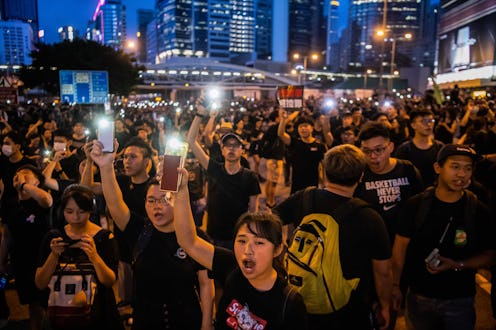News
Here's Why An Estimated 2 Million People Protested In Hong Kong

According to CNN, an estimated nearly two million people took to the streets in Hong Kong on Sunday as massive demonstrations against controversial amendments to an extradition bill continued despite lawmakers vowing to suspend the law. But if the large turnout at Sunday's demonstration is any indication, the Hong Kong protests are about more than just extradition.
Civil Human Rights Front (CHRF), the organization behind Sunday's protest, told CNN it believed Sunday's protest saw close to 2 million people take to the streets in Hong Kong, a number the organization said was "unprecedented." The cable news network reported that local police estimated 338,000 people marched the protest's original route, while photographs from the BBC showed demonstrators spilled onto neighboring roads.
Sunday's protest came a day after Hong Kong Chief Executive Carrie Lam had promised to suspend the legislative amendment enabling Hong Kong residents to be extradited for trial elsewhere, including mainland China. But Lam's decision to hit pause on the bill hasn't appeared to satisfy demonstrators, who demanded her resignation as they marched through Hong Kong's streets on Sunday.
In a statement released Sunday, CHRF vowed to continue protesting until Lam resigned and the extradition bill was withdrawn entirely, CNN reported. The group also demanded the city retract its previous characterization of the protests as a "riot" and release all detained or arrested protesters without charge. "Should the government refuse to respond, only more Hong Kongers will strike tomorrow," CHRF said in its statement.
Lam apologized to protesters in a statement released Sunday through a government spokesperson, but she made no move to permanently withdraw legislative efforts to amend the extradition law. "The Chief Executive admitted that the deficiencies in the Government's work had led to substantial controversies and disputes in society, causing disappointment and grief among the people," the statement read, according to CNN. "The Chief Executive apologized to the people of Hong Kong for this and pledged to adopt a most sincere and humble attitude to accept criticisms and make improvements in serving the public."
But protesters and opponents of the law have repeatedly said suspending the bill isn't enough due. "This is not good enough, simply not right," pro-democracy lawmaker Claudia Mo told The New York Times. "We demand a complete scrapping of this controversial bill."
According to NPR, protesters have argued that an agreement for extradition with China undermines the semi-autonomous territory's independence. Hong Kong has maintained a level of autonomy, including a separate criminal justice system, since the United Kingdom returned it to Chinese rule in 1997 through a "one country, two systems" deal that gave the territory the authority to govern itself until 2047.
In recent years, however, Vox has reported that Beijing has put increasing pressure on Hong Kong to pass laws, such as the extradition amendments, that would put the autonomous territory more "in line" with China. An extradition agreement between Hong Kong and China could potentially enable Beijing to clamp down its political critics in Hong Kong or on those with outspoken pro-democracy views.
"We know what the law means in China," prominent activist Rev Chu Yiu-ming told The Guardian, referencing the recent arrest of a fellow activist. "We must try to prevent Hong Kong from becoming a totalitarian place."